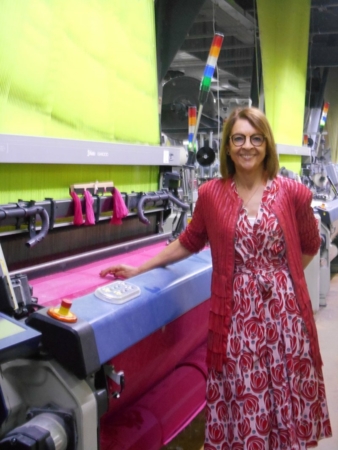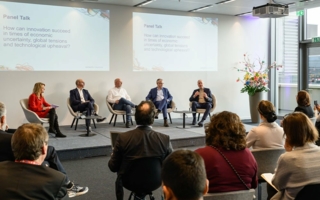28/08/2019 – Creativity, quality, service — auf Deutsch lesen
Guimarães Home Fashion Week
Held for the fourth time from 16 to 17 June 2019, the Guimarães Home Fashion Week was once again a highly successful event.
Like the year before, it was hosted at the atmospheric former monastery Pousada de Santa Marinha in Guimarães. Buyers flocked to the event from 49 countries, with the biggest delegations arriving from the US, Japan, Spain and Germany. And even Russian, Australian, Brazilian and South African guests registered this year. “This trade fair gives us a great opportunity to meet clients who we can’t visit every year,” explains Diogo Gobes of Sampedro’s sales department. Hans-Werner Voith, Founder of and Product Developer at the German company Tavo, adds: “The event has multiple advantages: its great working atmosphere, the opportunity to visit selected brands at their factories to work on collections, the relatively small order volumes keeping inventories and costs down and shorter delivery times. And when we develop our own designs, contracts are immediately signed to ensure nobody can copy or replicate the styles.”
“We will order later,” is one of the most commonly uttered phrases
“You sometimes need a lot of patience,” explains Fatima de Sousa, Commercial Manager at Domingos de Sousa, one of the industry’s big players. “About two years ago, we were in touch with a large prospect from Canada. Then they went silent for a long while. And now they’ve come back and placed some lucrative orders.”
The product range mainly focused on bed linen and bathroom textiles, and less on table linen. Gabriel Ribeiro, Marketing & Sales at Bovi, comments: “Table linen is a very region-specific product. Southern European countries have much more elaborate table tops than the north of Europe, for example.”
Generating business is not easy. “Our prices can’t always compete with manufacturers from countries like Turkey, Bangladesh, Vietnam and Morocco,” is another phrase frequently heard. José Luis Zamith, Commercial Director at Neiper, adds: “Some traders work more or less exclusively with Turkish suppliers. It is very difficult to change that habit.”
Read the complete article by Ilona Schulz in our issue textile network 9-10/2019 (appeared 27th August).




